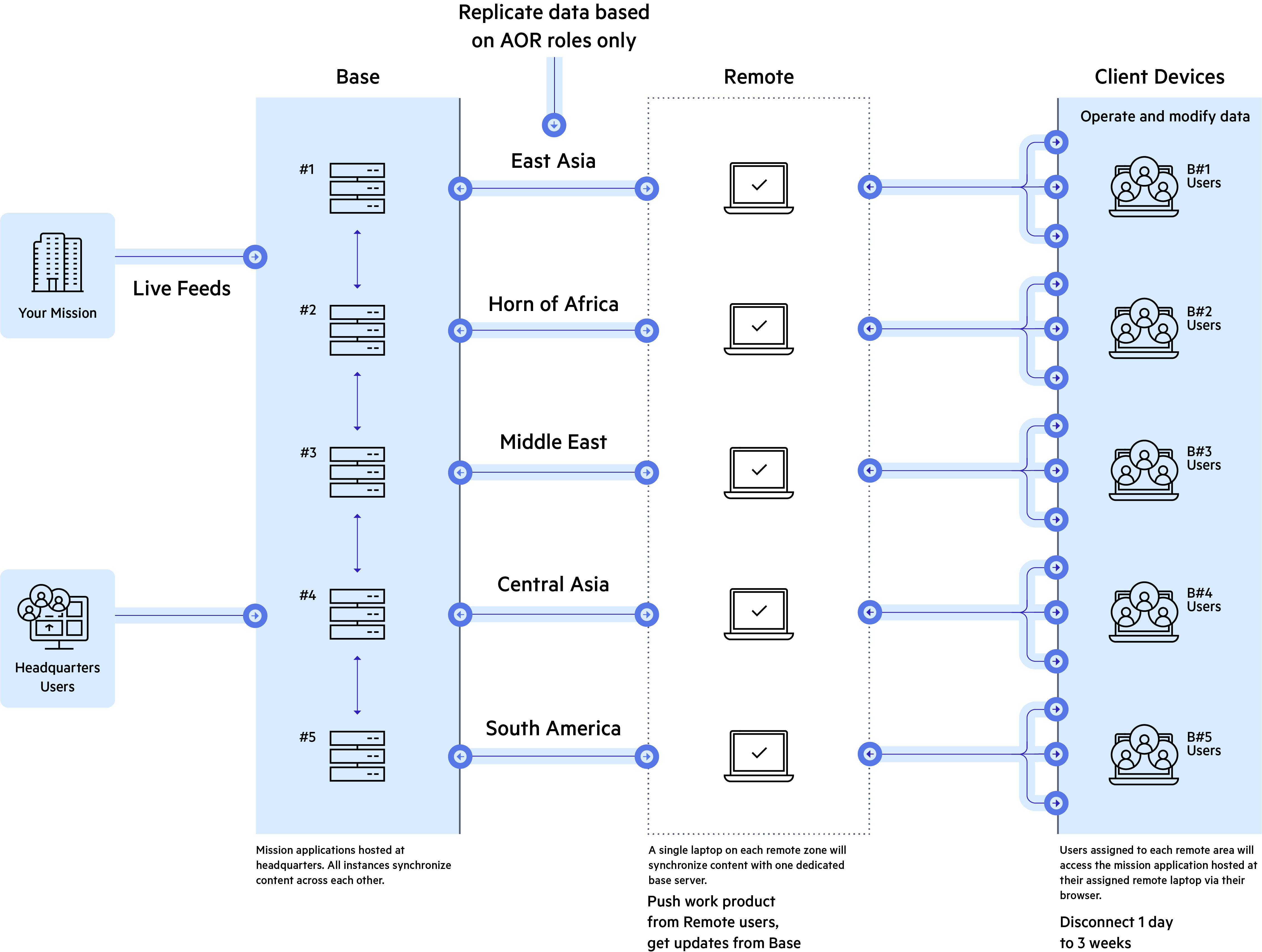In today’s data-driven world, maintaining accurate and consistent data across diverse deployment scenarios is critical for organizations. The Progress MarkLogic offering, also available as part of the Progress Data Platform, addresses this challenge with its Flexible Replication functionality. This is particularly valuable in Disconnected, Degraded, Intermittent or Limited (DDIL) connectivity environments, where unreliable networks can disrupt data consistency. Flexible Replication aids in upholding data integrity, enabling organizations to operate confidently in even the most challenging conditions.
Key Challenges in DDIL Environments
- Unreliable Connectivity: Frequent disconnects and degraded performance inhibit synchronous replication.
- Latency Sensitivity: Delays in data availability can impact decision-making.
- Asynchronous Operations: Nodes may process data independently and need conflict resolution on reconnection.
- Data Integrity Risk: Without proper reconciliation, stale or conflicting data can corrupt the system.
DDIL network environments pose unique challenges to mission-critical systems that must operate in the absence of reliable connectivity. In such scenarios, traditional database systems often fail to present consistent, up-to-date data across distributed systems. MarkLogic Flexible Replication is designed to thrive in these conditions—facilitating secure, resilient and near-real-time synchronization of data across nodes, even when connections are unreliable or temporarily unavailable.
Understanding Flexible Replication in DDIL Environments
Flexible Replication allows organizations to synchronize data across multiple MarkLogic databases, maintaining consistency despite network challenges. In DDIL environments—where connectivity may be unreliable, intermittent or entirely absent—this feature enables data updates to be propagated as soon as connections are restored, making it ideal for mission-critical applications.
Key Benefits of Flexible Replication
- High Data Accuracy: Enables nodes to maintain consistent data by propagating updates as soon as connectivity allows, reducing discrepancies in environments with unreliable networks. For example, a retail chain can keep inventory data synchronized across stores despite intermittent internet access.
- Flexible Deployment Options: Supports diverse setups, such as hybrid cloud and on-premises environments or air-gapped systems, allowing organizations to tailor replication to their needs. For instance, a company can replicate sensitive data on premises for compliance while syncing non-sensitive data to the cloud for analytics.
- Efficient Synchronization: Optimizes data transfer by replicating only changes and using compression, minimizing bandwidth usage and update times. This is crucial for remote locations with limited network capacity.
How Flexible Replication Addresses These Challenges
Here is an illustration of the Flexible Replication solution for multi-master bi-directional replication to overcome the challenges in the DDIL environment:

1.
Asynchronous, Multi-Master, Bi-Directional Replication
MarkLogic Flexible Replication supports asynchronous replication between databases, allowing each node to operate independently when disconnected. Once connectivity is restored, changes are replicated using a journal-based mechanism, which helps prevent updates from being lost.
- Use case: A field unit collects data offline. Upon reconnecting to HQ, the new data is synchronized, without manual intervention.
2. Scoped Replication via Domains and Filters
Flexible Replication lets you define scopes and domains —targeting specific collections, document patterns or directory trees. This reduces unnecessary bandwidth usage and results in only relevant data being transferred, which is critical in bandwidth-limited environments.
- Benefit: Minimizes data transfer over constrained links while maintaining operational relevance.
3. Conflict Detection and Resolution
The MarkLogic platform provides mechanisms for conflict detection using timestamps and custom resolution logic. In multi-master setups, this raises the possibility that the “most recent” or “correct” version of a document can be retained, even when updates happen independently on multiple nodes.
- Example: If the same document is updated differently at two locations during a disconnect, the platform can reconcile upon sync based on predefined logic (e.g., latest timestamp wins).
4. Persistent Retry and Fault Tolerance
Documents that fail to replicate due to connectivity issues are automatically retried until successful. The system maintains metadata such as
<flexrep:tries>
and
<flexrep:last-error>
in document properties, enabling monitoring and custom retry mechanisms.
- Advantage: Fosters eventual consistency and helps prevent data loss despite repeated connection failures.
5. Security and Provenance Built In
The platform supports secure and auditable data transmission across nodes. It enables encryption in transit and at rest, as well as provenance tracking to know where and when data was generated or modified.
- Relevance: In military and field applications, data authenticity and chain of custody are paramount.
Real-World Applications
Banking Sector
In banking, where data accuracy is non-negotiable, Flexible Replication is a game-changer. Financial institutions leverage this feature to:
- Maintain consistent customer account information across branches, even in rural areas with poor connectivity, enhancing seamless service
- Support regulatory compliance by keeping accurate, up-to-date transaction records across all locations
- Enable disaster recovery by replicating data to geographically diverse sites, helping to safeguard against data loss
Defense Sector
In the defense sector, MarkLogic Flexible Replication is instrumental in enabling mission-critical operations where data must be shared across command centers, mobile units and edge devices operating in DDIL conditions. For example, battlefield intelligence gathered by reconnaissance units can be captured locally on disconnected nodes and later synchronized with central databases when connectivity is restored, so decision-makers have the most up-to-date situational awareness. Flexible Replication boosts data consistency, provenance and security while minimizing bandwidth consumption through scoped, incremental replication. This capability supports operational continuity, joint-force coordination and resilient command-and-control systems , even in highly contested or remote environments.
Hybrid-Cloud and On-Premises Deployments
Organizations using both cloud and on-premises infrastructure benefit from Flexible Replication by:
- Synchronizing specific datasets, such as customer profiles, between on-premises databases and cloud environments for analytics
- Maintaining data sovereignty by keeping sensitive data on premises while leveraging cloud scalability for less sensitive workloads
- Enabling seamless data access across environments so employees can work with consistent data—regardless of location
Data Collection in Isolated Environments
In isolated or air-gapped environments, such as military operations or secure research facilities, Flexible Replication enables:
- Field units to collect data independently on disconnected devices, such as intelligence reports in military operations
- Data to efficiently synchronize with the central database upon reconnection, and critical information to integrate without manual intervention
- Maintenance of security by adhering to strict protocols, protecting sensitive data during replication
Advanced Capabilities Enabled by Flexible Replication
Flexible Replication integrates with the Progress Data Platform’s advanced features, unlocking powerful data processing capabilities.
Geospatial Data Processing
By replicating geospatial data, organizations can enhance location-based services to:
- Store geographical data as points, lines or polygons for efficient spatial queries, such as identifying nearby assets in real time
- Support advanced mapping applications, enabling faster decision-making in distributed environments
- Reduce latency by processing geospatial queries locally on replicated data
Metadata Search and Discovery
Flexible Replication enhances metadata management across distributed datasets to:
- Improve search efficiency by indexing common metadata, making it easier to find related information across databases
- Enhance data organization by categorizing replicated datasets based on shared metadata
- Support discovery of insights by enabling queries across distributed, replicated data
AI and Semantic Technologies
Flexible Replication supports advanced analytics and semantic data processing with features including:
- AI Integration: Replicated data, including geospatial and metadata, can be used to train AI models locally, enabling real-time analytics in DDIL environments. For example, a logistics company can predict delivery delays using replicated data at edge locations.
- Semantic Data Management: Leverage Resource Description Framework (RDF) triples to create knowledge graphs that span replicated databases for a unified view of interconnected data. This supports contextual queries and insights across distributed systems.
Conclusion
MarkLogic Flexible Replication empowers organizations to manage complex data environments with confidence. From helping maintain data accuracy in banking to enabling AI-driven insights in isolated settings, this feature delivers the flexibility and reliability needed in today’s data landscape. By adopting Flexible Replication, organizations can maintain data integrity across diverse scenarios, even in the most challenging conditions.
Flexible Replication is purpose-built to handle the realities of DDIL environments. It fosters data accuracy, integrity and consistency across distributed systems—supporting mission-critical decisions even in the absence of a reliable network. Whether deployed in defense scenarios, remote edge installations or rugged field operations, the MarkLogic platform empowers organizations to maintain operational effectiveness without compromising on data trustworthiness.
To learn more about how Flexible Replication can transform your data strategy, explore the MarkLogic Flexible Replication Guide or fill out the form on the Progress Federal Solutions page for a demo and someone from our team will contact you.

Shayne Brescia
Shayne is the Director of Professional Services for National Security Programs at Progress Federal Solutions, a subsidiary of Progress Software focused on federal initiatives. An Air Force veteran, he is committed to tackling critical security missions. Shayne is a proud father of three, embracing the joyful chaos of family life.

